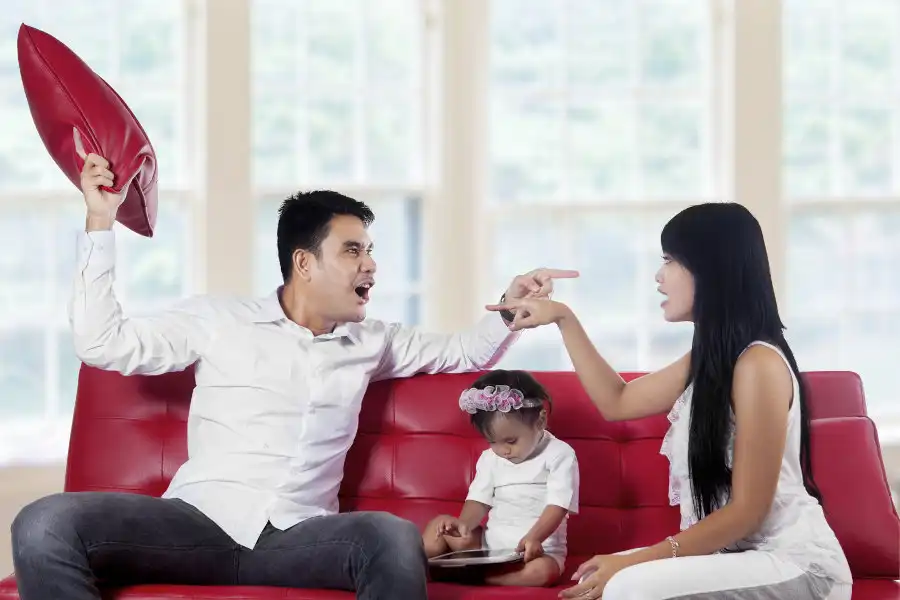California Domestic Violence Laws & Defense
If you or a loved one was arrested for domestic violence in California or served with a restraining order, you need an experienced California domestic violence lawyer immediately. The Ginny Walia Law Offices defends clients across San Jose, Santa Clara County, Alameda County, San Mateo County, and the greater Bay Area. We offer free phone or in-office consultations—call 408-724-9200.
What Counts as "Domestic Violence" in California?
California law covers a wide range of conduct between intimate partners and household/family members. "Domestic violence" may include:
- Domestic battery (offensive or harmful touching) against a spouse, former spouse, dating partner, cohabitant, fiancé(e), or the other parent of one's child (Penal Code §243(e)(1)). Punishable by up to 1 year in county jail and up to $2,000 in fines, plus mandatory classes and protective orders.
- Corporal injury to a spouse or cohabitant (inflicting an injury causing a "traumatic condition") (Penal Code §273.5). A wobbler: misdemeanor (up to 1 year county jail) or felony (2-4 years state prison) and up to $6,000 in fines. As of Jan. 1, 2025, prosecutors have 7 years to file 273.5 charges.
- Sexual assault, stalking, criminal threats, harassing calls, destroying property, and disturbing the peace, including coercive control (a pattern that unreasonably interferes with a person's free will), can support restraining orders under Family Code §6320.
Arrested for domestic violence or facing a restraining order? Time-sensitive defense starts now. Contact us for immediate legal representation.
Protective Orders You May Face
For more detailed information, see our restraining orders defense page.
- Emergency Protective Order (EPO): Issued by a judge at an officer's request; effective immediately and typically lasts the shorter of 5 court days or 7 calendar days.
- Temporary Restraining Order (TRO): Usually lasts until the first hearing (about 21-25 days).
- Restraining Order After Hearing (DVRO): Can last up to 5 years and may be renewed for five more years or permanently without new abuse, at the court's discretion.
DV protective orders frequently include stay-away and no-contact terms, firearm/weapon surrender, residence exclusion ("move-out"), temporary custody/visitation orders, and enrollment in counseling.
Firearms: Being subject to a DV restraining order or a qualifying conviction generally prohibits firearm and ammunition possession; surrender is required and proof must be filed with the court. Certain misdemeanor DV convictions also trigger a 10-year California ban; federal law can impose a lifetime ban for a "misdemeanor crime of domestic violence." See our weapons & firearms defense page for more information.
What Happens After an Arrest?
- Booking & Release: You may be booked and released on bail or citation.
- Criminal Protective Order (CPO): Courts often issue a no-contact order at arraignment to protect the alleged victim. Violating a CPO is a separate crime.
- Arraignment: You enter a plea; your Bay Area domestic violence defense attorney can argue for modified or peaceful-contact orders, challenge bail, and start preservation of evidence (texts, emails, GPS, Ring/Nest footage).
- Negotiations or Trial: We pursue dismissals, charge reductions, diversion where available, or prepare for trial.
Key Charges & Penalties (2025)
PC §243(e)(1) - Domestic Battery (Misdemeanor)
Up to 1 year county jail, up to $2,000 fine (or more if probation terms are imposed), protective orders, and mandatory classes. Probation often includes the 52-week Batterer Intervention Program under PC §1203.097. For more on battery charges, see our assault & battery defense page.
PC §273.5 - Corporal Injury (Wobbler)
Misdemeanor (up to 1 year county) or felony (2/3/4 years state prison) plus fines (up to $6,000), restitution, and mandatory classes if on probation. Statute of limitations: 7 years for crimes committed on/after Jan. 1, 2025 or where the prior SOL hadn't expired by that date.
Probation Terms Commonly Imposed: 52-week Batterer Intervention Program, CPO compliance, stay-away/no-contact, fines/fees, restitution, community service, and counseling—set by PC §1203.097 and local court practices.
Facing DV charges with immigration concerns? Our defense strategies protect both your criminal case and immigration status.
Statute of Limitations (How Long the State Has to File)
- PC §273.5 (corporal injury): 7 years (amended PC §803.7 by SB 690 (2024), effective Jan. 1, 2025).
- Other DV crimes (e.g., PC §243(e)(1) domestic battery): Generally 1 year for misdemeanors and 3 years for felonies unless a specific statute says otherwise. (SB 273 (2020) previously extended filing time for 273.5 to 5 years; SB 690 now sets it at 7 years.)
Why this matters: Even if an incident is older, corporal injury charges may still be filed under the new 7-year window—a critical 2025 update.
Immigration Considerations for Non-Citizens
Domestic violence accusations can carry serious immigration risks. Federal law makes a non-citizen deportable for conviction of a "crime of domestic violence," among other grounds. Whether a California offense qualifies depends on statutory elements and the record of conviction. Some outcomes (e.g., certain pleas to PC §243(e)(1) limited to "offensive touching") may be safer than others; each case needs immigration-savvy defense.
Defending Domestic Violence Cases in the Bay Area
We build tailored defenses, including:
- Self-defense or defense of others: Reasonable belief of imminent harm and proportionate force.
- Insufficient evidence / fabrication / motive to lie: Relationship dynamics, custody disputes, or ulterior motives can produce unreliable claims.
- Lack of injury (for charges that require it): PC §273.5 requires a traumatic condition; absence of such injury can defeat that charge (though PC §243(e)(1) does not require injury).
- Illegally obtained evidence: Unlawful searches/seizures, coerced statements.
- Restraining order scope: Seek modification to peaceful-contact when appropriate to allow co-parenting, residence access, or counseling.
- Program-based resolutions: Where available, diversion, DEJ, or plea to non-deportable/non-firearms-disqualifying alternatives.
Firearms, Work, and Family Impacts
- Firearms: DVROs require immediate surrender and proof of compliance; certain convictions trigger California 10-year bans and/or federal lifetime prohibitions. Violations risk new charges.
- Employment & Licensing: Background checks, security clearances, and state licensing may be affected.
- Custody & Family Court: DV findings can impact custody and visitation; coercive control is now part of "abuse" under Family Code §6320.
Record Clearing
Misdemeanors and some felonies (if not sentenced to state prison) may be eligible for dismissal (expungement) under PC §1203.4 after successful completion of probation; certain felonies may be reduced to misdemeanors under PC §17(b). Outcomes are fact-specific—consult a San Jose domestic violence attorney about eligibility.
Why Hire Ginny Walia Law Offices?
- Trial-tested Bay Area domestic violence defense in Santa Clara, Alameda, San Mateo, and surrounding counties
- Strategic restraining order advocacy (contesting, modifying, or seeking peaceful-contact orders where appropriate)
- Immigration-informed defense to protect status wherever possible
- Focused, fast action to preserve evidence, challenge no-contact terms, and pursue dismissals, reductions, or alternatives
Call 408-724-9200 for a free consultation with a San Jose domestic violence attorney today.



